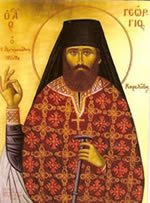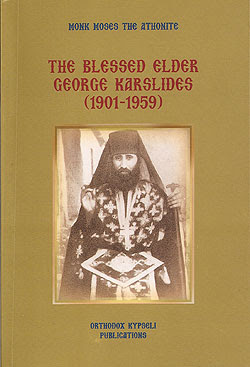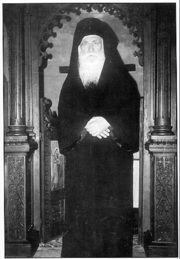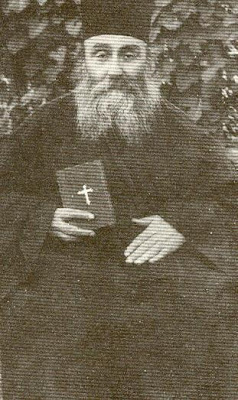Blessed Father Cosmas the Apostle of Zaire:
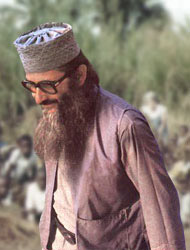 Orthodoxy in Zaire:
Orthodoxy in Zaire:
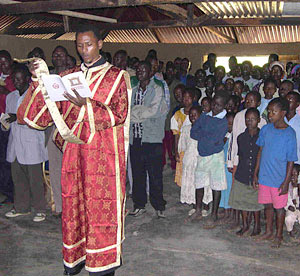
A book about his life and legacy of Blessed Father Cosmas:
 Introduction to Apostle to Zaire
Introduction to Apostle to Zaire
The Life and Legacy of Blessed Father Cosmas of Grigoriou
In every generation there are those few exceptional souls who rise out of the conventionality of social life to become pathfinders to the catholicity and otherworldliness of Christianity. Heroic and uncompromising, they imitate Abraham and become exiles and martyrs for Christ, following Him with loving exactness and mountain-moving faith. They "hate their life in this world" in order to keep it—and that of their neighbor's—for eternity; and to successive generations they become models to imitate, witnessing, long after their departure, to the honour the Father bestows on those who serve Him.
Such a one was blessed Father Cosmas of Grigoriou, enlightener of Zaire.
A Model of Mission Work in this Age of Antichrist
From as early as eighteen years of age he received from God the call to work in His mission field. Possessed of a dynamic personality that "was inspired by a burning love for Christ, he did not want to live a conventional Christian life nor to be limited to some usual ecclesiastical career and service. He longed to offer himself entirely to God and his fellow man." He sought not honors, for "his chief concern was with the salvation of men and the upbuilding of Orthodoxy in Zaire."
The beloved Cosmas was, in the words of the former Metropolitan Avgoustinos of Florina, "the trailblazer of a beautiful journey for our race." He made Christ's departing directive to "teach all nations" his point of departure from a life of compromise and port of entry for Orthodoxy in the sub-Saharan and the hearts of countless souls. Unlike the missionaries of heterodox confessions, he laid stress on both the first and second part of the Great Commission: "Go ye therefore, and teach all nations, baptizing them in the name of the Father, and of the Son, and of the Holy Spirit; teaching them to observe all things whatsoever I have commanded you." His success, or rather faithfulness, in carrying out the first half of the Great Commission, was a direct result of his faithfulness and resolute determination to observe the second half, that is, to be exact in teaching them "to observe all things" that Christ has commanded us.
It could not be otherwise, for the African is neither as the contemporary European, worn out by centuries of dizzying ideologies and spent on a myriad of humanistic philosophies, nor as the typical American, quick to compromise and moderate things in order to achieve outward success. His noble, humble soul still inclines toward the other world and his simple, intuitive mind still has a healthy disposition for the noetic realm. A few months before his departure from this life, Father Cosmas visited the monastery of his repentance and spoke to the pilgrims there of this African nobility and their desire for authentic, ascetic Orthodoxy. Bishop Athanasios Yievtich, a close disciple of the great contemporary Church Father, Archimandrite Justin Popovich, was present and relates what Fr. Cosmas had to say:
"They are people with a sensitivity and awareness of the inner world. Europeans usually underestimate them, but they are very mistaken. The soul of the African inclines toward mysticism and for this reason Orthodoxy has something to say to them and something to offer, but only authentic Orthodoxy— monastic, hagiorite Orthodoxy. For among the brethren of Africa, witchcraft and magic holds great sway, a real demonocracy. In Africa, I saw how true the Gospel of Christ is! Everything that He said about the possession of men by the demons, I saw first hand. However, the Living and True God is more powerful than Satan and all his servants. Let it be understood, however, that true missionary-apostolic work cannot be carried out in Africa if one does not decide to leave his bones there."
And so in teaching the native Africans the entire Gospel of Christ and revealing to them the undistorted Image of the God-man and His Church, it was only to be expected that his self-offering would likewise be complete and unqualified. In his "unique, genuine and very useful" study on mission work, entitled Thoughts about Missionary Work from Experience, he lays out the cornerstone principle for all who would follow his example:
"The missionary's beginning is significant, however it is not the sum of the matter . . . The outset might be blessed or might become blessed at the end. What's important is that the giving be true and total, without holding back, with a disposition to self-sacrifice and self-denial, and with the aim of leaving our bones among the natives . . ."
Long before one leaves his bones on the mission field, however, he must have discarded his pride and vainglory first, if he wants the final offering to be fruitful. Thus, for Fr. Cosmas the true missionary, in order to attain the blessed end, must leave no room for jealousy or vainglory, but rather must understand all to be shared: "common the struggle, common the pain, and common the glory of the Church." He must "offer an open heart, love and communicate with others, concern himself with his own problems without adding more, being attentive to what others are doing, without turning to the devil and causing division." And carrying out his duty in humility, "the true missionary does not seek recognition for his work, neither from the natives nor from those abroad, for the testimony of his sound conscience and the witness of his spiritual father and co-workers is sufficient for him."
An Ascetic First
Father Cosmas left no room to doubt that he followed his principles, his words were based on experience and his beginning and end were blessed. And all of this is based on the fact that he "was first of all an ascetic and afterwards a missionary," as Archimandrite Ioanikios has written elsewhere in this book. He knew from experience what asceticism, spiritual warfare, fasting, vigil and prayer mean for the Church. "We thank the Lord," writes his Abbot George, "for, even if he was a man like us, he nevertheless disdained the earthly, the fleshly comforts, the human pleasures, all for the love of Christ, and chose a road that was harsh, combative, extremely tiring and humanly punishing. He did all of this for the love of God, his brothers and fellow men."
Elder George further certifies all this with a story from Father Cosmas' early days at the monastery: "I once passed by Fr. Cosmas' little cell and saw his bed: wooden boards and on top of the boards, a little thin sheet. He didn't even have a blanket. Having seen that, and other things, I thought that the brother had the grace of God and ought to become a monk."
His asceticism, however, was not reserved to sleeping on wooden boards or even to fasting, vigil and prayer. Father Cosmas was above all unrelenting in his work of building up the Church in Zaire. Father Michael Christodoulidis of Cyprus writes of his visit to the Kolwezi mission and Father Cosmas' asceticism in work:
"That which distinguished him most was his industry and diligence in work, his method and organization of labor, his intelligence, speed and facility in confronting difficulties, his ingenuity, and his unshakeable faith, spirit of love and sacrifice . . . Untiring in work, he would labor long hours in every kind of task. We didn't know what midday was and what lunch means. The table of the Mission center is set from noon until late in the evening. Work 'from the morning watch until night' on roads that are non-existent, with vehicles and machines that were always breaking down, with bloody sacrifices, 'in afflictions, in necessities, in distresses, in wounds . . . in labors, in vigils' (2 Cor. 6: 4-5)."
The above description not only finds repeated confirmation in a number of similar testimonies, but from the words of Father Cosmas himself, who at the same time points us to another aspect of his giving of priority to asceticism. He writes the following:
"It is well known that we all work here on a twenty four hour basis, under poor conditions, with the consequence being bodily strain and spiritual slackening. Consequently, toward the realization of spiritual and bodily replenishment, the existence of two monasteries, one men's and one women's, at some distance from the mission base, is deemed most appropriate . . . The monastery would work strictly as a monastery or, with the blessing of the local Metropolitan, as a metochian of Mount Athos, without any entangling with the mission."
It was because Father Cosmas believed that a local Church could not stand without monasticism that he gave priority to the founding of a monastery and towards the end of his life he finally saw the realization of his plans with the establishment of the holy women's Monastery of St. Nektarios.
Exactness in Orthodoxy
Shortly after Fr. Cosmas' repose, upon seeing the spiritual labor he had accomplished, his successor Father Meletios said: "Father Cosmas' work in Africa is quite extensive. I found the whole Athonite typikon in place in Zaire. The Christians with prayer ropes in their hands. In church they chant all together lead by the choir of boys. No one communes without first having confessed. They keep strictly the fasts of Wednesday and Friday. They celebrate daily the Divine Services of Matins, Vespers and Small Compline. And on Sundays the congregation exceeds four hundred."
Many have commented: "How is it that the Africans, being only recently baptized, can maintain such an intensity and exactness in their Orthodoxy, while many of us in parishes in Greece, America and elsewhere are much more lax?" The answer, I believe, lies partly in that Father Cosmas, their father, guide, and example was himself strict and precise in his living and imparting of Orthodoxy. He was a monk in the long tradition of Athonite monasticism, and he hailed from the city of Ss. Cyril and Methodios, Thessaloniki, known for its rich ecclesiastical tradition. He kept with exactness, as well as discernment, the canons and standards of the Church, not out of some kind of reactionary conservatism or unfeeling zeal, but out of humility and because they provide what is best for man's soul, derived as they are from the experience and wisdom of the Saints and Fathers of the Church.
One such issue in which he consciously chose the blessing of God's Saints over the transient benefits of our ecumenical age was baptism. "When baptizing," he says, "I implement the Athonite order of things. We've done 250 baptisms, and not only with idol worshippers, but also with Catholics who become Orthodox, we baptize them in deep rivers. My actions will have consequences when news reaches the Patriarchate of Alexandria, which holds that the Protestants are only in need of chrism. Until then, however, we will only do baptisms so as to have St. Nicodemos' blessing."
Father Cosmas, as is clear further down, was not one to fly in the face of ecclesiastical authority. His decision to baptize those coming from heterodox confessions was done purely out of love for their souls and their eternal salvation, as well as love for God and His Saints, not suffering his conscience to disobey their sacred teachings. He acted not only out of respect for the Saints of ages past, but out of obedience and humility before the wise counsels of living saints: "I remember the words of Father Paisios, who told me that most of the time the baptism that the heretics perform only passes over their skin." Having this in mind, his love for the catechumens dictated that he provide them with the complete and saving initiation into the eternal life of the Church. This had consequences, of course, but not only for his relationship with the Patriarchate. Primarily it had consequences for the establishment of a spiritually healthy, powerful and faithful Orthodox Church, before which the Orthodox world now stands in admiration.
Similarly, Father Cosmas' success in establishing a strong, stable and healthy Orthodox way of life among the natives is also due to his refusal to adopt non-Orthodox methods and style. Father Cosmas writes: "It is wrong to have recourse to the means and methods of the heterodox. Let us leave to Orthodoxy her own color, in faith, in teaching, and in her arts. Let it not fade in the mission field." This should be applied not only to clear-cut mission fields, of course, but also to Orthodoxy in the Diaspora, as today many Orthodox often assimilate aspects of foreign cultures indiscriminately. For, if Father Cosmas' words hold true, then we must not expect the kind of results we see in Kolwezi in our part of the world if we are busy appropriating "the means and methods" of the heterodox. One may have to work very hard to avoid this compromise, yet we have Father Cosmas and the Church in Zaire as testimony that the struggler will have his reward.
Father Cosmas did not stop at simply avoiding the influence of heterodox culture within Zaire. He extended this principle to protect those young souls he sent abroad to study and be formed in the Orthodox way. He writes: "It is almost assured that the young native is destroyed when sent to study in Europe, returning as a theologian only in terms of his diploma, not his heart . . . In Kolwezi, we send the pious young man to the monastery of our repentance . . . where he learns the Greek language, theological matters, dogmatics, ethics, worship, the typikon, iconography, and Byzantine music both in practice and theory. He studies Orthodoxy in the "university of the desert," keeping company with sanctified elders and spiritually-gifted fathers and learning from them the 'according to likeness.' Purified and forming Christ within him, the young candidate becomes a good co-worker and our ideal successor."
Father Cosmas' care for the young native soul sent to study abroad arose out of his deep pastoral sensitivity and not out of any alleged ecclesiastical chauvinism. It was this sensitivity and a blessed single-mindedness and constant focus on bringing his disciples to the measure of the stature of the fullness of Christ, and not any misguided idealism, that made it hard for him to countenance disregard of the canons. With respect to the canons governing ordination, this was particularly difficult because suitable candidates were few and the observance of the canons demanded much faith and patience. But, Father Cosmas, together with his Bishop, observed the canons, for they knew that there was a spiritual law at work and a punishment that the violators of the canons cannot escape. He writes: "The canons of the Church, of course, must be observed with respect to ordinations. Otherwise, the canons will avenge themselves and we will pay for our concessions (1 Tim. 3: 2-13)." And elsewhere he writes: "In areas where excessive tolerance is shown, the situation continually deteriorates and I am very concerned that at one point it will become incurable."
Basic Presupposition: Working under the Authority of the Local Bishop
Father Cosmas set out from the beginning to carry out a work that was ecclesiastical, without reference to his person but rather centered on Christ and His Church. Thus, he came to Africa not as an individual performing a personal work, but as a monk of a specific monastery sent to enlist in the service of the Church under the local Bishop. He would often say, "If my work is my own, it will disintegrate as soon as I leave. If, however, it rests on an ecclesiastical base, the Church will assume it and it will continue."
Father Cosmas wanted everything to be in harmony with the canonical order of the Church. He advanced to the planning and realization of each work he undertook only after securing the blessing of his Bishop. He would not tire of emphasizing, "I offer my services with my Metropolitan, His Eminence Timothy Kontomerko."
Even when pressed by his own (according to the flesh) father's fear that financial support would dry up due to certain problems that had arisen, Father Cosmas remained unwavering in his faithfulness to the ecclesiology of the Church:
"I set out from my monastery with the blessings of my Geronda and the other fathers and the explicit command of Father Paisios, who is also my spiritual guide, to work together with the heads of the Church for the good of the Mission. The Church exists wherever there is a Bishop and faithful flock. Without the Bishop the faithful do not constitute the Church, but a Protestant heresy. Consequently, the line that I follow, working together with the local Bishop, is the most advisable, and yet even if I wanted to do something different, you know that I don't have such a blessing from my monastery."
In cases where the Bishop is a source of problems, Father Cosmas counseled against creating open rifts with him, as they would "harm rather than help." He saw that taking "recourse to a worldly model of contemporary form . . . toward the finding of justice, produces no results." In such cases, where solutions cannot be found, "then it is preferable that we prudently withdrawal with our co-workers, handing over the work to a new contingent, so as not to scandalize innocent souls (Mat. 18:7)."
In response to the opinion of some that one should not support missionary work in an area where the Bishop is not "beyond reproach," Father Cosmas was not sympathetic. "This position is shown to be baseless and utopian, for humanly judging the situation we consider a purification of ecclesiastical leadership as practically impossible and thus we tread from bad to worse, and this in the very age of the Antichrist. All the same, what should be done? Should we stop the evangelization of the nations? Of course not. On the contrary, we will devote ourselves even more to the work of missions and, with the grace of God and our own stability and love, the mission will continue and advance, and the "blameworthy" bishop along with it. The most important point of all, however, is this: we mustn't trust in our own spirituality, sincerity and holiness, if we, in fact, have something of these. 'Let him that thinks he stands take heed lest he fall' (1 Cor. 10:12)."
A Visionary who took One Step at a Time
As a result of conversations with illumined Fathers on Mount Athos and indications he received from his own conscience while in the mission field, Father Cosmas knew to be patient, that the work was just beginning and that he would not see its full flowering in this life. "Continue on," Fr. Paisios of the Holy Mountain told him, "however, the struggle will be a long one, for the people there will be slow in coming to accept Christianity."
With this in mind, then, and being a true Orthodox missionary, Father Cosmas was not anxious or persuaded to adopt short-range solutions. Unlike the missionaries of heterodox groups, Father Cosmas made a point of avoiding a predetermined programmatic approach. You won't find references to five-year programs or slick slogans in the writings of Father Cosmas. He believed that missionary work "is a linkage of one's own temperament, knowledge, possibilities and local conditions. It is not necessary to follow certain molds . . . The missionary is free and when he is open to the grace of God, the Holy Spirit will speak riches in his heart and indicate to him what to do, gradually and in correspondence to the development of the work. Let us leave room for prayer to act without rushing the situation with narrow logic, absolute measures or the assessments of critics at each stage."
Father Cosmas was a visionary who took one step at a time. He understood early on that he must see things in terms of generations not years. Thus it was that he laid great stress on the upbringing and training of the young men and women under his care, for the future leadership of the Church. It was for this reason that, in addition to the founding of a monastery, he undertook the establishment of boarding houses at the Mission Center, where young men and women came to stay, study, pray, learn and grow into mature Orthodox Christians. Today, twenty-two years later, the children that first took up residence at the Mission center have become the clerical, monastic and lay leaders of the Church in Zaire, just as Father Cosmas foresaw.
A Fruit-bearing Tree for Generations to Come
Father Cosmas was an exemplification of the Gospel saying of the Lord: "Except a corn of wheat fall into the ground and die, it abideth alone: but if it die, it bringeth forth much fruit" (John 12: 24). His life was a series of "precious deaths" to the "old man" which made his bodily death "fruit-bearing." These fruits are now offered not just to those who knew him while he lived, but also to all those who have since and will in the future come to know Christ and follow Him into the mission field through Father Cosmas' example. "The seed has fallen into the earth," writes Abbot George. "It dies, for if it does not die, it will not sprout forth a beautiful tree, with the sweetest of fruits, under which many souls will find rest."
Already Abbot George's words have found bountiful fulfillment, not just in Kolwezi, but also throughout the Orthodox world. The greatness of Father Cosmas' work and example lies, as he himself has said, in that it has not died with him but continues, on an even greater scale. And not only the work he began in Kolwezi, but also the work of Orthodox mission worldwide. Today, this namesake of Holy Cosmas Aitolos, that regenerator of the race of Hellenes, stands as torchbearer for missionaries to the races of men the world over, in Africa, Latin America and Asia. They cite him as their inspiration and the archetype for their own work.
In Madagascar, in the span of six short years, the Orthodox Church has been established through the grace of God and under the leadership of the missionary-Bishop Nektarios. Since 1994 over 12,000 souls have been baptized, 62 parishes founded and 26 churches built. His Grace Bishop Nektarios had the blessed Father Cosmas as his model. He looked to his example when starting out, in the erecting of church temples, the providing of philanthropy, in prisons, hospitals, with the feeding of the hungry and, in general, in the whole work of the mission.
On the other side of the world, in Taiwan, there is another "disciple" of Father Cosmas, the Hieromonk Jonah. He too looks up to heaven at the flaming example of Father Cosmas for inspiration and guidance in his newly founded mission. He has only just begun (2001), and the obstacles and challenges facing him are enormous, yet, as with Father Cosmas, his "disposition to self-sacrifice and self-denial," and "aim of leaving his bones among the natives" has already made it possible for God to act mightily.
Who will be the next to follow in Blessed Father Cosmas' footsteps? The Lord alone, Who knows every soul before its coming into the world, speaks and reveals which monk or layman should enter next into His vineyard for the reaping of the harvest. When it came time for Father Cosmas to depart this life, the Lord revealed to him his successor in Kolwezi. His abbot George tells us that, "shortly before his final departure [from Mount Athos] for Africa and his death, he visited Father Meletios in his cell and told him that he would continue his work." And, indeed, a few months later, days after Father Cosmas departed this life, Abbot George called Father Meletios in to suggest that he succeed Father Cosmas, without, however, knowing anything of what Father Cosmas had predicted.
So, the work of the Church will by no means cease, for He "who desires that all be saved and come to the knowledge of the Truth" is constantly raising up workers for His Vineyard. It is sufficient only that we imitate such blessed ones as Father Cosmas and "hate our life in this world" and "die to it," so as to "keep it for eternity." Then, perhaps, we too may be counted worthy of treading that path which guides one on the beautiful journey of our Christian race, which Father Cosmas blazed so resolutely.
—Peter Alban Heers
Feast of Saint Cosmas Aitolos, Equal to the Apostles
August 24, 2001
http://www.orthodoxinfo.com/general/frcosmas_intro.aspx
